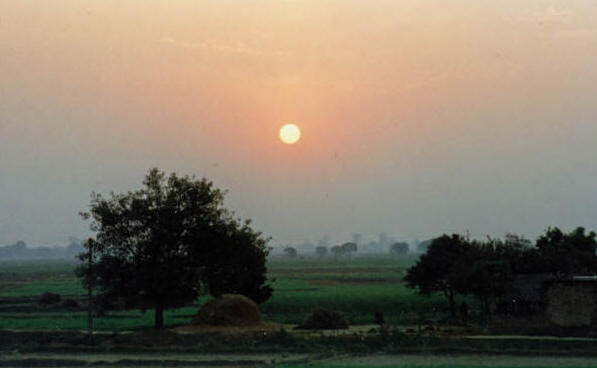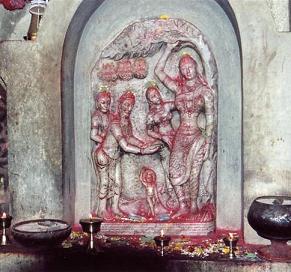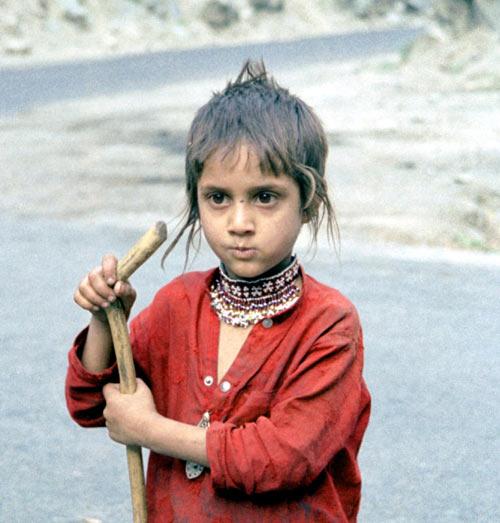| |

(1) Iksyubaak
For ancient
peoples living in Central Asia, the time was neither
movement nor space. It was a dot.
The tribes, living on gathering and hunting, left their
territories, sometimes staying in places for decades,
but kept moving on towards the southwest without
returning. In the Iranian Plateau, most of the tribes
settled down. But one of the tribes called Shakya still
continued moving and changed their route to the East.
Thousands of years have passed since their initial
movement. The Shakyas, descendant of the sun, reached
the water's edge of Bahgira River at the foot of the
Himalayas.The Shakyas settled down e at Kohsara under
the command of the then King Iksyubaak.
(2) Maya
Many centuries
having passed since Iksyubaak's era, the Shakyas reached
the highest of prosperity under the reign of King
Suddohdana. The life of gathering and hunting changed to
agriculture of rice in paddy fields. People were free,
enjoying their prosperous lives.
Suddhdana married Maya, a Nepalese princess.
She had the natural virtue to follow her husband.
She was quiet. She was his shadow.
The evening star shone above the ridge of the Himalaya.
The arching sky was filled by the moon and stars.
The curtains and windows were fully opened.
The limpid air and light filled the room.
They put on the clothes woven of air and moonbeams.
She shone.
A pair of bowstrings snapped.
The two bows fell down in a tangle.
Somewhere deep in her flesh,
she felt something strange happening.
Like a mist of light,
not only within her body but it shrouded her,
at the same time,
it extended beyond the faraway horizon.
She told him of her pregnancy.
He said he would build another palace for her to give
birth.
She replied that she would prefer her native place in
Nepal,
where Himalayan and Karakorum's flowers were flooded in
bloom.
A cattle shed, calmly moving palace, pulled by 10 bulls,
was
built by the order of Suddohdana.
Chaperoned by Mahapajapati, her younger sister,
she left Kapirabastu Palace in the cattle shed.
On the 4th day in Lunbini where
a big pipal tree rose high surrounded by
wild flowers riotously blooming,
Maya appealed to her sister when
she felt an unexpected contraction.
Under the shade of the pipal tree,
Maya gave birth to Siddhartha,
assisted by her sister.
Message horses were dispatched
to east and west
with good fortune.
The next day, dark clouds closed the canopy of sky.
Maya said to her sister in her fever that
she wanted to get back to her husband.
Again the horses rushed to both directions
with Maya's deep thought on their backs.
The ten bulls retraced their steps.
On the 7th night after the birth of Siddhartha,
Maya woke up in a bed of the palace.
Suddodana opened the windows.
Maya said, "It is the same nigh."
Mahapajapati said. "I will take care of this baby."
Maya calmly nodded and breathed her last.
| |
(3) Mahapajapati
Suiddhartha in the arms of Mahapajapati was in the
unconsciousness of pre-language. His unconsciousness well
contained and equated with consciousness. The sphere of
pre-language was that of logic, but logic was sense that far
exceeded logic itself, sense was consciousness,
consciousness was cognition, cognition was existence.
|
|
 |
|
Consciousness, unconsciousness, sense, logic, non-logic formed a
deep memory in him. He himself was naught or the void from the time of
his beginning. He had nothing but absolute severance. Severance was his
existence. By growing up gradually, his memory formed a chaotic
contemplation about being born, getting old, suffering from illness
and dying. There was no way to be answered.
Mahapajapati had realized his entire severance. She knew that affection could be only the way to save his desolation,
as Suddohdana well understood him. too.For the Syakyas, descendant of the sun,tears of sadness and sorrow had to be voided.
Three palaces with ponds
filled by sacred water,
flowers of lotus; scarlet, white, blue,
fragrance of sandal wood from Khasi,
garden of peafowl,
large white parasol,
wearing clothes and shoes made in Khasi
selected lady's maids,
evenings of music and dances.
But nothing could clear his sorrow.
Mahahpajapati said to Suddohdana.
"Neither materials nor enchantment can save him."
Suddohdana said.
"I will have him married."
Yashodara, a daughter of Brahman, was selected.
Suddohdana asked her what she wanted the best.
She said that she wanted nothing but Siddhartha but
she needed a library.
Every possible Veda, Sutra,
books of philosophy and poetry were collected.
Tributes for the wedding were heaped up mountain-high.
Among them, there was Kantaka,
an Arabian horse from the Iran Plateau.
Dancing,
music,
poetry reading by professional reciters,
acrobats,
the wedding party continued for a month
t o consume the tributes.
The palaces were open to any visitors equally,
while Kusatoriyas set up camps
for those who ran over the palaces.
Gorgeous foods and drinks never ran out.
When the party was over,
people began to call him Gautama.
(4) Yashodara
For Gautama and Yashodara to ride on Kantaka,
who never allowed even the stablemen to touch him,
a bit was not necessary at all.
With both of them on his back,
Kantaka ran hundreds of miles tirelessly
in the fields, forests and Himalayan mountains,
smoothly as a flow of water,
rapidly as a flying arrow.
Three of them were in one united body.
They were always together in the world of pre-language.
The world of pre-language was that of hearts.
One day, Yashodara found something unusual in Kantaka.
She saw something sad in his mind.
One evening, Gautama said a phrase in the Veda.
"Leaving that house and this house."
Yashodara naturally added the next phrase to his.
"Thus, the saints walk away calmly."
She understood him.
She lost her words.
The evening star shone above the ridge of the Himalaya.
The arching sky was filled by the moon and stars.
The curtains and windows were closed.
The room was filled by all nature.
A flow of the sacred river stopped.
They floated on the water.
The mountains moved.
She tightly bound her heels to his
in the fragrance of sandal wood..
They sank deep into an entire silence.
The curtains and windows were fully opened.
The room was filled by limpid sunbeams.
In his arms, she recognized his inevitable severance which
existed somewhere deep in his soul.
She understood that she had to share the severance with him.
In raven-black night,
she knew that Gautama slipped out of bed quietly.
She said nothing.
She pretended.
Soon, she heard the sadness of Kantaka.
She wept.
She squeezed Gautama's pillow tightly.
| |
(5) Sjata
A rumor spread that Gautama disappeared.
Rumor fed upon rumor.A man said that he heard Yashodara
was pregnant.People stood on her side and praised her
with sympathy
in reason of her silence.
Other person said that the Suddhdanas would never ruin
forever because of its wealth and fortitude. While, a
Brahman said that there would happen a supreme fortune
in due course because Gautama became a priest. The
uproar was getting to quiet down. |
|

|
|
Gautama followed by
Channa, his faithful manservant, was by a spring.
He changed his clothes to a course Kashaya.
After having Channa shave his hair,
he told him to get back to the palace
to serve Yashodara and look after Kantaka..
Channna, filling tears in his eyes, followed his words.
With heavy heels,
he went deep into the forest.
When he sat down under a tree,
he saw Yashodara in his body.
She smiled with limpid eyes and disappeared soon.
He went into a meditation in silence.
For Gautama, birth was one of the physiological phenomena of
the grand nature. However, even reading a countless number
of
books, he had been unable to find any answer to the other 3
questions; getting old, suffering from illness and dying. He
visited
and listened to many saints and philosophers, but he could
not
find any satisfactory answers. which were far below the
level of
his spiritual state.
He moved to trying all kinds of legendary practices of
religious
teachings -
Practice of fear,
detestation,
solitude,
standing on one leg without sleeping,
stopping breath,
sleeping on thorny bed
fasting.
Even in an ultimate condition of the practices,
he could not see any change in his spirit.
He was getting weak.
One morning, after bathing in a river,
he sat down under a tree.
His fainted.
Sjata, the youngest of 10 daughters of a millionaire,
found a shriveled dead tree. It was Gautama.
She called the servants and carried him to her house.
She poured a spoonful rice porridge and milk into his mouth.
Gautama revived.
(6) Gautama Buddha
Gautama found the radical disciplines
brought nothing but collapse.
He adopted the medium.
He moved to Ulveda.
He sat down under a asivatta tree
by Neranjapajhata River.
He meditated there for 7 days.
His consciousness stopped and disappeared.
Neither religious exultation nor revelation visited him.
After 7 days, he recognized that
he had reached the ultimate emancipation.
It was a complete release from wisdom and mind and body.
He had no words to explain the state that he had achieved.
He began to walk.
| |
(7)
Nirvana
Gautama headed for Magada. People he met on the way were
all ignorant. They were too dark for him to teach what
he had obtained. He had no theoretical method to preach. |
|
 |
|
He happened to meet
his five friends
with whom he had studied together
in the deep forest after his becoming a priest.
He preached them about the four truths in his mind;
Life is full of suffering;
suffering is caused by desire;
enlightenment comes through the quenching of desire,
one should practice the correct ways.
Upon listening to him, they immediately understood him
and attended his journey.
One day, they met 30 men and 29 women
who were at a loss in a forest.
After listening to their confusions,
Gautama preached them the four truths.
His calm words were deeply impressed
into 59 souls and matured in them independently.
His doctrine began to spread slowly but steadily.
At Salnaht where the saints gathered and discussed,
he preached the four truths and eight right ways of
practicing.
His preaching gave an impact to the audience.
King Binsara of Magada believed in Gautama.
Living on a bowl of foods a day obtained by religious
mendicancy
and getting a thorough practice and meditation everyday,
Gautama's journey with his 5 attendants continued.
They wanted neither to argue nor to persuade or insist.
They calmly listened to people and saved their distress
in their minds one by one steadily.
After Gautama's becoming a priest,
50 years had passed by unnoticed.
For him, everything was supremely beautiful.
Everything; people, natural scenery, houses animals, plants
or even stones and clods; was living vividly.
In Kusinara, on the way to Lumbini,
where he had been born, he got out of condition.
Ananda said to Gautama.
"If and when you died, how should we go thereafter?"
Gautama said to Ananda.
"Oh, my friend! You need not to get worried about.
Things with figures ruin someday without exception.
I became to believe in myself.
But, we have the four truths and eight right ways.
You go with the further contemplation of yours and
the daily practice following these truths and ways."
It was on the day of full moon
in the month of Vaishaka in 483 BC,
Ananda set up a bed for Gautama
by folding a garment under the sal trees on a small hill,
where the horizon could be watched afar.
Gautama lied down on the garment bed.
In the dot where he his gaze vertically spreading
and the faraway horizon crossed,
Gautama saw Yashodara and Rhafra, his son,
wearing clerical robes.
The dot included countless zeros.
The distance was a zero, too.
For the tribe of the sun,
tears of sadness and sorrow had to be voided
Putting the palms of their hands together,
Yashodara and Rhafra, his son, sent their smiles of
blessing and farewell to Gautama and bowed.
Gautama Buddha closed his eyes and
finished his life of 80 years of age.
|
|